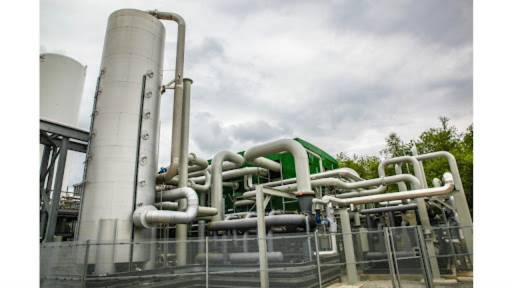Scientists are turning thin air into power storage

A liquid air energy storage plant; Image: Highview Power
Five decades ago, engineers stumbled upon a potential clean power storage breakthrough. But the world soon forgot about it.
Now, with renewable electricity production overtaking coal for the first time, that old idea is back and looking stronger than ever: using liquid air to efficiently store excess renewable energy.
The problem: While fossil-fuel power plants can essentially switch on-and-off at will, renewable energy sources like solar and wind are intermittent.
- This means that sometimes there isn't enough electricity being generated, increasing the risks of power outages.
- On the flip side, sometimes there’s too much electricity created, which could damage the power grid.
A potential solution lies in liquid air energy storage. This process takes excess energy from the grid and uses it to cool air from the atmosphere until it liquefies (at -196°C), after which the liquid air is stored in insulated tanks.
- In times of high energy demand, this liquid air can be reheated so that it rapidly expands back into a gas, driving a turbine that generates electricity.
Cooler heads prevail
Liquid air is considered a more reliable option than the two main ways that power companies currently store excess renewable energy:
- In lithium-ion batteries, which require rare metals
- Via hydropower, which needs specific geographies for dam construction
Looking ahead…The world’s first liquid air energy storage facility, under construction by UK company Highview Power, will power up in 2026. It could provide enough backup electricity for ~200,000 homes once it comes fully online the following year.
Share this!
Recent Science & Emerging Tech stories

Science & Emerging Tech
| October 14, 2025Renewable energy achieves a new global milestone
Planet Earth recently experienced a historic power move in every sense of the word.

Science & Emerging Tech
| October 9, 2025There’s a scientific limit to your friend circle
Struggling to keep in touch with everyone from high school isn’t a character flaw—it’s a built-in scientific fact.

Science & Emerging Tech
| October 7, 2025E.T. could be hiding in our Solar System, new study suggests
Saturn�’s icy moon Enceladus isn’t just another frozen speck in space—it’s quickly becoming one of the top contenders for finding life beyond Earth, according to new research.
You've made it this far...
Let's make our relationship official, no 💍 or elaborate proposal required. Learn and stay entertained, for free.👇
All of our news is 100% free and you can unsubscribe anytime; the quiz takes ~10 seconds to complete